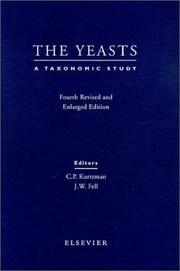| Listing 1 - 3 of 3 |
Sort by
|

ISBN: 9780444813121 0444813128 0080542697 9780080542690 9786611038991 1281038997 Year: 1998 Publisher: Amsterdam ; New York : Elsevier,
Abstract | Keywords | Export | Availability | Bookmark
 Loading...
Loading...Choose an application
- Reference Manager
- EndNote
- RefWorks (Direct export to RefWorks)
The yeasts are a phylogenetically diverse group of fungi characterized by unicellular growth. Yeasts have been used for bread making and brewing beverages for millennia, and have become increasingly important in biotechnology for production of fuel alcohol, organic acids, enzymes, and various pharmacologically important chemicals. Other species are serious human, animal, and plant pathogens. Since publication of the 3rd edition of this book in 1984, numerous new species and genera have been described, many because of the application of new molecular biological methods. Molecular comparisons
Fungi --- Yeast fungi --- Levures (Botanique) --- Champignons --- Classification. --- Classification --- Yeasts --- Basidiomycetes --- Blastomycetes --- Endomycetales
Periodical
Abstract | Keywords | Export | Availability | Bookmark
 Loading...
Loading...Choose an application
- Reference Manager
- EndNote
- RefWorks (Direct export to RefWorks)
Focuses on research on all aspects of Saccharomyces and other yeast genera. The topics covered include: genetics; genomics; molecular biology; cell and developmental biology; biochemistry; physiology; pathobiology; biotechnology; ecology; taxonomy; and evolution. Abstracts and full-text (PDF only), 1997- ; abstracts only, 1996.
gisten --- Genetics --- yeast [fungi] --- Yeasts --- Yeast --- Levure --- genetics --- Periodicals. --- Périodiques --- Yeasts. --- 582.282.23 --- 579 --- 57 --- Fungal Proteins --- Saccharomycetineae. Yeasts. Brettanomyces --- Microbiology --- Biological sciences in general --- Periodicals --- YEASTS --- Agriculture Sciences --- Agricultural Biotechnology --- periodicals --- Soil Chemistry, Microbiology, Fertility & Fertilizers --- Agriculture Sciences. --- Agricultural Biotechnology. --- periodicals. --- 579 Microbiology --- 582.282.23 Saccharomycetineae. Yeasts. Brettanomyces --- Yeast. --- genetics. --- Nematospora --- Edible fungi --- Leavening agents --- Yeast-free diet --- Levures (Botanique)
Book
ISBN: 9780190270711 0190270713 Year: 2018 Publisher: New York, NY Oxford University Press
Abstract | Keywords | Export | Availability | Bookmark
 Loading...
Loading...Choose an application
- Reference Manager
- EndNote
- RefWorks (Direct export to RefWorks)
Humans knew what yeast did long before they knew what it was. It was not until Louis Pasteur's experiments in the 1860s that scientists even acknowledged its classification as a fungus. A compelling blend of science, history, and sociology The Rise of Yeast explores the rich, strange, and utterly symbiotic relationship between people and yeast. "The great Victorian biologist Thomas Huxley once wrote, "I know of no familiar substance forming part of our every-day knowledge and experience, the examination of which, with a little care, tends to open up such very considerable issues as does yeast." Huxley was right. Beneath the very foundations of human civilization lies yeast--also known as the sugar fungus. Yeast is responsible for fermenting our alcohol and providing us with bread--the very staples of life. Moreover, it has proven instrumental in helping cell biologists and geneticists understand how living things work, manufacturing life-saving drugs, and producing biofuels that could help save the planet from global warming. In The Rise of Yeast, Nicholas P. Money--author of Mushroom and The Amoeba in the Room--argues that we cannot ascribe too much importance to yeast, and that its discovery and controlled use profoundly altered human history. Humans knew what yeast did long before they knew what it was. It was not until Louis Pasteur's experiments in the 1860s that scientists even acknowledged its classification as a fungus. A compelling blend of science, history, and sociology The Rise of Yeast explores the rich, strange, and utterly symbiotic relationship between people and yeast, a stunning and immensely readable account that takes us back to the roots of human history."--Publisher's description.
Yeast. --- Yeast fungi. --- Microorganisms. --- Yeasts. --- Levure (agent de fermentation) --- Levures (botanique) --- Microorganismes. --- SCIENCE --- Microorganisms --- Life Sciences --- Biology --- Microbiology. --- Yeast --- Yeast fungi --- Yeasts --- Fungal Proteins --- Fungi --- Basidiomycetes --- Blastomycetes --- Endomycetales --- Germs --- Micro-organisms --- Microbes --- Microscopic organisms --- Organisms --- Microbiology --- Nematospora --- Edible fungi --- Leavening agents --- Yeast-free diet
| Listing 1 - 3 of 3 |
Sort by
|

 Search
Search Feedback
Feedback About UniCat
About UniCat  Help
Help News
News